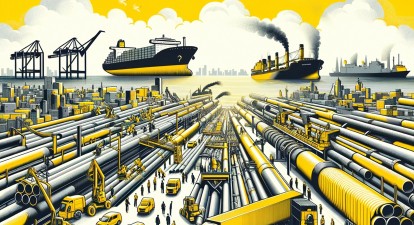Two years of full-scale war significantly changed the volume of Ukrainian exports and the vectors of export logistics. Due to shelling, destruction of infrastructure, inaccessibility of sea routes, periodic blocking of land borders with neighbor-countries, Ukrainian export earnings in 2023 reached one of the lowest levels in the last decade, first deputy prime minister of Ukraine — minister of economy of Ukraine Yuliia Svyrydenko said.
Among exporters who experienced painful changes there is Interpipe, a global producer of steel pipes and railway products based in Ukraine. Despite the difficulties caused by the war: the drop in demand on the Ukrainian market, the increase in the cost of logistics and the constant shelling of Nikopol, where Interpipeʼs facilities are concentrated, the company continues its operations.
Absolutely, the temporary suspension of all customs duties and quotas for Ukrainian products in the European Union and the USA was a significant support, but arising logistical challenges are very significant and often beyond the companyʼs control. Interpipe is building new transportation routes in order to save jobs and output volumes, provide products to end-consumers and be able to pay taxes to the state budget, bringing the Victory closer. How does the company overcome logistical difficulties during full-scale war?
Export challenges
The deliveries by sea to foreign customers accounts for about 40% of the total Interpipe’s sales volumes, and the supply by trucks to European countries is almost 50%. So, the main «export» problems of the company in the last two years are the closure of the deep-sea ports of Odessa, the associated overloading of land corridors and, as a result, the increase in the price of delivery to EU.

Oleksiy Yanovskiy
procurement and logistics director at Interpipe
Interpipe is an exporting company with a huge sales map. Since the Ukrainian market is quite narrow, our main clients are located outside of Ukraine. Therefore, our task, as a logistics service, is to find a solution on how to deliver the cargo to the client: it was the same during the COVID period, and it is the same now during the war.
Until the middle of 2022, the situation with the sales of Interpipe products abroad was difficult. Then the company began a radical change of supply chains to its key markets: North America, the EU and the Middle East. The route to North America underwent changes: it was necessary to quickly arrange delivery to Izmail and transshipment in the port there, and then — loading of river barges, delivery to the Romanian port of Constanta and another transshipment there.
Until December 2023, Interpipe transported its products to customers in Central Asia by road. The trucks went through Romania and Bulgaria to Turkey, from there — to transshipment in Baku, and then by rail to end-customers in Uzbekistan, Turkmenistan and other Central Asian countries. Starting from January 2024, the company provides an economically feasible route from Odesa to Batumi by water transport, involving rail transport only for the «last mile».
Generally, in 2023, Interpipe already had a rebuilt and stable logistics. Customers in Europe received products by road trucks, while the markets of the Middle East and the USA were delivered by ships from Romanian ports. However, thunder suddenly struck — in November 2023, the Ukrainian-Polish border turned out to be blocked. Tariffs and transit time for the delivery of goods to and from EU countries immediately increased.
At the same time, there were also positive moments. Thus, in October 2023, a temporary sea corridor from Odesa was opened, which Interpipe used a little later sending the first vessel on January 2, 2024. Meanwhile, problems arose with the sale of products to the countries of the Middle East. We are talking about the danger in the Red Sea, the waters of which have been blocked by Yemeni Houthis since the end of 2023, attacking ships. Because of this, Interpipe is forced to transport cargo to customers in the Middle East via the Cape of Good Hope in South Africa.
Due to the blockade of the Ukrainian-Polish border only in November 2023, Interpipe lost $1 million. This is money lost due to a 50-60% increase in the price of road transportation and a shortage of trucks.
By the way, the problem with the border has not been resolved yet, so losses will continue to grow.
The companyʼs financial performance is also affected by the involuntary search for detours to the Middle East through Africa and Odesa ports. Container lines introduced a surcharge for bypassing the Suez Canal on the way to the Middle East — about $50 per ton. Interpipe transports up to 4,000 tons per month to these markets, so monthly losses reach $200,000, and delivery time increases by two weeks.
How Interpipe solves complex problems
Despite all these difficulties Interpipe remained a major exporter of steel pipes and railway products. Last year the companyʼs products were delivered to 57 EU countries, North America and the Middle East. Last year it was also possible to maintain sales volumes almost at the level of 2022. This became possible due to company’s stable logistics.
Oleksiy Yanovskiy, procurement and logistics director at Interpipe
We supply technological products for each client individually, so there are many nuances in such logistics. For example, when delivering a pair of wheels, each of them must be put on a stop, so as not to spoil it, it must be securely packed against corrosion. Or the loaders at the port may damage the premium pipes on beam transshipment, so we stuff such pipes into containers. Another one challenge is delivering pipes to customers in Europe at a specific time on a specific day. And we do it! Just-in-time!
So, in each of the three key markets, Interpipe successfully overcomes logistical difficulties. For example, in order to circumvent the blockade of the Ukrainian-Polish border, specialists of Interpipe’s logistics department found new carriers and tested alternative routes through the Danube river and railway crossings. Dozens of technical and commercial issues were agreed upon, interaction with new logistics terminals was established, and the foundation of relations with new partners was established. The Ministry of Infrastructure of Ukraine and business associations also played an important role in establishing the processes, directly persuading Polish trade unions to cancel the border blockade.
And in 2024, a temporary sea corridor from the ports of Odessa aided. By starting to use it instead of the Danube ports, Interpipe attracted additional transshipment capacities and reduced the load on land export-import corridors. The unblocking of the Polish border in January 2024 further reduced the prices for the transportation of goods by road transport.
However, some of these achievements are still being offset by the activity of the Houthis and the necessity to pay bonuses to shipowners when entering the ports of Odessa. The increase in the cost of transporting goods to the countries of the Middle East already makes some contracts unattractive. However, the company continues to look for economically viable routes there.
Two more factors can worsen the situation: repeated long-term blocking of the Polish border by local farmers and the cancellation of the duty-free trade regime with the EU for Ukrainian carriers in the summer of 2024. If this happens, transportation will become more expensive, and there will be a shortage of trucks.
Вы нашли ошибку или неточность?
Оставьте отзыв для редакции. Мы учтем ваши замечания как можно скорее.



